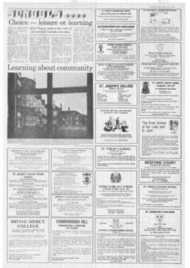Page 2, 11th October 1985
Page 2

Report an error
Noticed an error on this page?If you've noticed an error in this article please click here to report it.
Tags
Share
Related articles
Private Face Of Tutu
Tutu's Meeting With Pope Poses Problem For Sa Authorities
Archbishop Hurley Describes Anti-detention Protests In...
Tutu Backs Church Group
`inadequate, Irrelevant, Ineffective' Message Challenged
Kairos supported by Bishop Tutu
by Jack O'Sullivan
BISHOP Desmond Tutu has given qualified support to the Kairos* statement issued last week by more than 150 South African clergymen, outlining a Christian response to apartheid.
"I am in agreement with the basic thrust of that document", said the Anglican Bishop of Johannesburg at the beginning of his six-day trip to Britain, which ended on Monday. But he felt that the document had unfairly dismissed the "so called white church leadership". He thought it would have to be revised "because it may alienate some people who should be behind us".
The bishop thanked Christians in Britain for their prayers and help. He urged them to pressurise the Government into taking stronger measures against South Africa, noting that 73 per cent of blacks supported economic sanctions.
"Your country's greatness has really been in moral leadership and I hope that you can recapture that moral ground", said the bishop.
Bishop Tutu said that he was not a pacifist. He described as "mental gymnastics" opposition in Europe to the use. of violence by blacks.
He found it odd that after "lauding the resistance movement of the second World War and having made Dietrich Bonhoeffer a hero of modern times, suddenly the Western Church has woken up and become pacifist".
The bishop warned that South Africa was "on the edge of a massive catastrophe". He added: "We will be needing a miracle or the intervention of the international community if we are to be moved away from the edge of the precipice".
He was dismissive of Mr Botha's reforms. He called the South African state president "a courageous man", but added, "the great sadness is that he doesn't have the convictions of his courage".
The purpose of Bishop Tutu's visit was to join with other Anglican leaders in preparing for the 1988 Lambeth Conference. During his stay he met the Prime Minister and party leaders. Following her talks with the bishop, Mrs Thatcher refused to impose economic sanctions on South Africa.
*The Kairos Document, Challenge to the Church, published jointly by the Catholic Institute for International Relations (CIIR) and the British Council of Churches, available from 22, Coleman Fields, London Ni.
blog comments powered by Disqus













